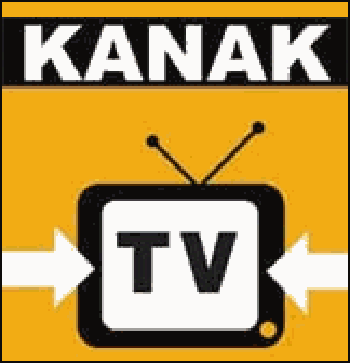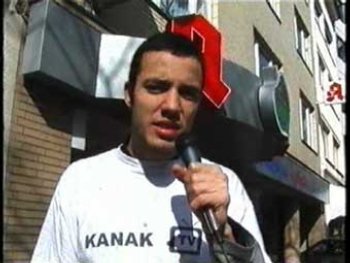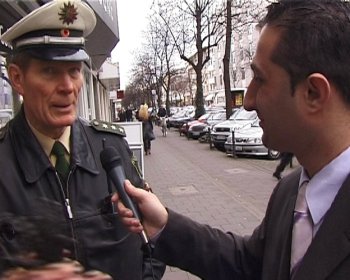1 The practice
1.1 Description of the project
Kanak Attak
 "Kanak TV" is a media project initiated by the German Kanak Attak network that was founded in 1998. Kanak Attak was created to present a new migratory self-awareness to the broader public. With their manifesto, that was published the same year, Kanak Attak clearly dissociates itself from common ideas of “mültükültüralizm” and a “post-modern concept of Interculturalism”. Using the politically incorrect and out-dated word “Kanak” – sort of an equivalent to the American “nigger” – as a name, Kanak Attak has set a statement that is provoking yet also demonstrates their confident self-conception. They describe their objectives as follows: "Kanak TV" is a media project initiated by the German Kanak Attak network that was founded in 1998. Kanak Attak was created to present a new migratory self-awareness to the broader public. With their manifesto, that was published the same year, Kanak Attak clearly dissociates itself from common ideas of “mültükültüralizm” and a “post-modern concept of Interculturalism”. Using the politically incorrect and out-dated word “Kanak” – sort of an equivalent to the American “nigger” – as a name, Kanak Attak has set a statement that is provoking yet also demonstrates their confident self-conception. They describe their objectives as follows:
- “Kanak Attak” is a community of different people from diverse backgrounds who share a commitment to eradicate racism from German society. Kanak Attak is not interested in questions about your passport or heritage, in fact it challenges such questions in the first place. Kanak Attak challenges the conservative and liberal orthodoxy that good “race relations” is simply a matter of tighter immigration control. Our common position consists of an attack against the “Kanakisation” of specific groups of people through racist ascriptions which denies people their social, legal and political rights. (kanak attac manifesto, http://www.kanak-attak.de/ka/about/manif_eng.html)
- Kanak Attak is a German nationwide project with eight local/regional groups in the cities of Berlin, Frankfurt, Hamburg, Cologne, Tübingen, Stuttgart, Munich, and Freiburg. Each of these groups organise local meetings, conferences and the exchange with the other groups. Kanak Attak is very active in participating in political events as well as creating opportunities for migrants to gather and exchange thoughts.
- Apart from meetings and events such as lectures, readings etc. Kanak Attak also provides information on its website: articles about legal obstacles for migrants, information about current political events, and also satirical contributions to the discussion about legalisation (e.g. a guide to marriage “what is the colour of your toothbrush”, T-shirts)

Kanak TV
"Kanak TV" was initiated by members of the local Kanak Attak group in Cologne. Like Kanak Attack the TV group has political interest in promoting a different point of view about immigration into Germany. Through the means of filming and producing short documentaries they focus on the genre of visual arts. Miltiadis Oulios, one of the founding members of "Kanak TV" describes the beginning of the project: “we were meeting with the Kanak Attak group here in Cologne, we were about 10 people discussing what we could do about the current situation regarding migrants. We didn’t want to do anything that was expected from us, like protesting or something like that.”
The slogan “migratory self-authorisation” was chosen as a motto for "Kanak TV" as well as well as for Kanak Attak. They aim to question the way migrants are usually depicted in media and treated in public. They aim to uncover racism and partly also the “fight against racism” as a social construct that builds up and constantly repeats a social hierarchy that marginalises groups of people, especially those with a migrant background.
Their work deals with the question how images are being made, manipulated, and used to promote a certain picture of “the foreigner”. At the same time they are using the medium of film to create anti-images (or juxtapositions “Gegenbilder”) and to de-construct the common but fundamentally mistaken perspective on immigration.
“We reject every practise that gazes at, measures (?), and puts migrants into categories. Instead we turn the view on ‘Alemanni’ who think it is normal to prove and question others and reduce them by a view form above.”
(kanak TV manifesto, http://www.kanak-tv.de/index.html)
The movies are mostly documentaries featuring interviews or portraits. The ideas as well as the creative approach come from the members of the film group. The reports typically use confrontation and confusion – for example when a young female reporter asks a guest at a party if she minds being served only by “kanaks”. As a result of their work "Kanak TV" has produced several short movies that give an interesting and surprisingly entertaining insight into their point of view.
A short overview shows what themes are featured in the movies of "Kanak TV":
- “40 Jahre Einwanderung” (forty years of immigration), 9 min., 2001. On November 10th 2001 the city of Cologne celebrated the fortieth anniversary of the first contract with Turkey sending “Gastarbeiter” (guest workers, migrant workers) to Germany with a splendid gala sponsored by the Ford automobile company. Besides the Mayor lots of the local celebrities took part in the event covered by the Kanak TV camera team.To reveal the reduced and constantly reducing use of the idea of migrant life and culture Kanak TV reporters mirrored the questions that are usually directed to migrants back to Germans: “by doing this the seemingly natural viewpoint which is usually held by ‘the Germans’ when looking at ‘the others’ was supposed to be uncovered and explored to the point of absurdity.” The "Kanak TV" members observed that most of the Germans were using exactly the same arguments migrants have been using for years when they try to justify their state of being and had to fight against unification and the categorisation of identity.
- Interview extracts from the documentary “40 years of immigration”:
Kanak TV reporter: Where do you come from?
Guest: Excuse me?
Kanak TV reporter: Where do you come from?
Another guest: I am a teacher at a primary school
Kanak TV reporter (insisting): But you are from Germany?
Guest: Yes, I am from Germany, Cologne
Kanak TV reporter: Is beating up women – like Dieter Bohlen, a famous German singer did – part of your German culture?
One guest: No, certainly not
Another guest: Well, it happens, naturally... no, I mean not naturally. But it happens...
Another guest: I think, that’s a very suggestive question.
Another guest: That is happening in all cultures. You can’t say it is typically German or typically English. You find it everywhere on this world.
- “Weißes Ghetto” (white ghetto), 8 min., 2002. “Cologne-Lindenthal is a relatively prosperous and homogeneous neighbourhood: you won’t find a single person with a migrant background in the streets. What is happening there? Are these Germans separating themselves from the rest of the world? Is Lindenthal a white ghetto?” These are the questions that "Kanak TV" reporters ask themselves and the residents. With the theme of this short documentary they refer to the debate within the German media about so called “ghettos”: living areas with a high percentage of migrant inhabitants that are usually seen as centres of violence. By doing so, they approach a topic that is often forgotten in this context: the “segregation” and formation of neighbourhoods in which almost no migrants live.
- “Das Märchen von der Integration” (the fairy-tale on integration). This is a fictional story about a migrant woman on her way to be integrated into the German society. Her tasks are set by the German government – so it appears in the movie – and range from “hold a conversation with a German person for at least 4 minutes”, “eat a typical German dish and finish it all”
- “Recolonize Cologne” (the recolonisation of Cologne), 45 min., 2006. The latest movie of Kanak Attak is not available on the internet yet. One can currently watch it in different public places however.
Results – Influence on public debates about immigration and integration
Four short movies originated from the activities of "Kanak TV". Additionally, the written manifesto and the text “steps” express the elaborated ideas and objectives that stand behind the project. But the results of "Kanak TV" are more than the construction of an entertaining website. The movies are frequently shown at film festivals and at other occasions such as exhibitions (“born to be white”, Wien, 1. 6. 2005 – 22. 7. 2005; “Projekt Migration”, Cologne, 1. 10. 2005 – 15. 1. 2006), theatre-shows etc. Consequently Kanak Attak manages to present their point of view to a broader public and to actively take part in debates.
1.2 Time, structure and steps of the project
"Kanak TV" was founded in 2001 with their coverage of the gala celebrating the 40th anniversary of the guest worker programme. Since then meetings and film productions take place occasionally. About 10 people are involved in the work of Kanak Attak, mostly without specialist training in filming or editing. However one professional cameraman does assist the Kanak TV reporters.
1.3 Place and context
Migration to Germany
During the 1950s the German government fixed the first “Gastarbeiter”- contract with Italy. This agreement allowed thousands of unemployed workers from Italy and later also from Greece, Turkey, Portugal, and Yugoslavia to travel to Germany and find work there, in a country that experienced an economic boom and was in the need for (cheap and willing, male, bad paid...) workers. By calling them “Gastarbeiter” (guest workers) it was clear that their status was only transitory and that they were supposed to go back to their country of origin after having finished the work in Germany. But this did not happen: many workers proved to be too important for the factories, especially for the automobile production and so it would have been inefficient to send a worker home once he had learned the acquired skills. Up until the 1970’s about 5 million workers and their families migrated to Germany. Giving up the rotation principle and making it legal for “Gastarbeiter” to gain a “permanent resident status” Germany finally became a country of immigration – a fact that wasn’t paid much attention to for many years. The integration of first generation, but also second or third generation migrants were long ignored by political or social programs.
Recently the role and problems of people with a migratory background have been discovered by the politicians and the media. An intense discussion about how to deal with the “after-effects” (a relatively high percentage of school children speaking insufficient German; the formation of neighbourhoods that are dominated by, for example, Turkish speaking inhabitants such as Berlin Kreuzberg) has been going on since.
Kanak Attak as an organ of migratory self-authorisation
It is at this point the activist Kanak Attak and also "Kanak TV" want to intervene. When talking about identity and the sense of belonging to a certain group migrants are often lumped together in ethnic entities and find themselves labelled as “others”, migrant activities and the maintenance of their original culture are euphemistically celebrated in “multikulti-festivals”. As they describe it: “we don’t want to be reduced to our ethnicity, instead, we think that our attitude is much more decisive and that is why we do Kanak Attak. We participate because we have the same position and not because we have the same ethnic background.”
1.4 Target
With their short movies and documentaries they want to reach everyone, to quote: “the more German and self-pleasing the audience, the more sardonic the laughter” (from the "Kanak TV" website). Their aim is to surprise and even shock the audience and to encourage the discussion about migration in Germany.
1.5 Methodology
"Kanak TV" tries to show their movies a broad public. They participate in festivals, exhibition, and public readings. The movies are also shown to groups such as students, in clubs etc. on request. On their website they encourage people to spread their movies on the internet, they offer free downloads of the movies, and one can also order the videotapes at cost price.

1.6 Authors, financing and networks
The members of "Kanak TV" are volunteers participating in the activist group. There is no governmental or other group behind the network, consequently, the funding and maintenance of the network is done with private engagement and support.
2 Hints for an evaluation
|